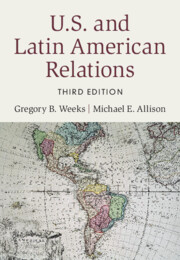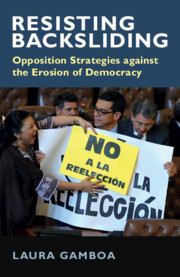138 results
The Devil and Florentino: Specters of Petro-Populism in Venezuela
-
- Journal:
- Comparative Studies in Society and History , First View
- Published online by Cambridge University Press:
- 01 April 2024, pp. 1-27
-
- Article
-
- You have access
- Open access
- HTML
- Export citation
The Escribano of Babel: Power, Exile, and Enslavement in the Venezuelan Llanos During the War of Independence (1806–1833)
-
- Journal:
- The Americas , First View
- Published online by Cambridge University Press:
- 22 December 2023, pp. 1-28
-
- Article
-
- You have access
- Open access
- HTML
- Export citation
Socio-demographic, migratory and health-related determinants of food insecurity among Venezuelan migrants in Peru
-
- Journal:
- Public Health Nutrition / Volume 26 / Issue 12 / December 2023
- Published online by Cambridge University Press:
- 10 November 2023, pp. 2982-2994
-
- Article
-
- You have access
- Open access
- HTML
- Export citation
The Devil and Democracy in the Global South: Hugo Chávez's Transnational Populism
-
- Journal:
- Journal of Latin American Studies / Volume 55 / Issue 4 / November 2023
- Published online by Cambridge University Press:
- 20 December 2023, pp. 653-677
- Print publication:
- November 2023
-
- Article
-
- You have access
- Open access
- HTML
- Export citation
5 - Crony Capitalism in International Comparison
-
- Book:
- Making Democracy Safe for Busines
- Published online:
- 22 June 2023
- Print publication:
- 06 July 2023, pp 148-168
-
- Chapter
- Export citation

U.S. and Latin American Relations
-
- Published online:
- 08 December 2022
- Print publication:
- 01 December 2022
-
- Textbook
- Export citation
12 - Latin American Immigration and U.S. Policy
- from Part II - Current Issues
-
- Book:
- U.S. and Latin American Relations
- Published online:
- 08 December 2022
- Print publication:
- 01 December 2022, pp 325-355
-
- Chapter
- Export citation
9 - Challenges to U.S. Hegemony
- from Part II - Current Issues
-
- Book:
- U.S. and Latin American Relations
- Published online:
- 08 December 2022
- Print publication:
- 01 December 2022, pp 231-259
-
- Chapter
- Export citation
4 - “Chávez Vete Ya”: The Erosion of Democracy in Venezuela
-
- Book:
- Resisting Backsliding
- Published online:
- 10 November 2022
- Print publication:
- 03 November 2022, pp 98-128
-
- Chapter
- Export citation

Resisting Backsliding
- Opposition Strategies against the Erosion of Democracy
-
- Published online:
- 10 November 2022
- Print publication:
- 03 November 2022
International Clientelistic Networks: The Case of Venezuela at the United Nations General Assembly, 1999–2015
-
- Journal:
- Latin American Politics and Society / Volume 64 / Issue 3 / August 2022
- Published online by Cambridge University Press:
- 21 October 2022, pp. 37-66
-
- Article
- Export citation
Hope Amid Crisis: Normative Ambiguity, the Middle Class, and Investment Fraud in 2000s Venezuela
-
- Journal:
- Latin American Politics and Society / Volume 64 / Issue 4 / November 2022
- Published online by Cambridge University Press:
- 07 October 2022, pp. 70-93
-
- Article
-
- You have access
- Open access
- HTML
- Export citation
Participatory Democracy, Democratic Education, and Women
-
- Journal:
- Journal of Latin American Studies / Volume 54 / Issue 4 / November 2022
- Published online by Cambridge University Press:
- 05 September 2022, pp. 617-645
- Print publication:
- November 2022
-
- Article
-
- You have access
- Open access
- HTML
- Export citation
Rethinking the Postwar International Migration Regime from the Global South: Venezuela in a Global History of White Immigration
-
- Journal:
- Itinerario / Volume 46 / Issue 2 / August 2022
- Published online by Cambridge University Press:
- 26 September 2022, pp. 214-232
- Print publication:
- August 2022
-
- Article
-
- You have access
- Open access
- HTML
- Export citation
3 - Constitutions
-
- Book:
- A Pandemic of Populists
- Published online:
- 30 June 2022
- Print publication:
- 14 July 2022, pp 83-105
-
- Chapter
- Export citation
5 - Democracy and the Quality of Democracy: The Never-Ending Quest
- from Part II - Problems of Democracy in a Democratic Age
-
- Book:
- Latin American Politics and Society
- Published online:
- 11 June 2022
- Print publication:
- 09 June 2022, pp 165-200
-
- Chapter
- Export citation
10 - Arcadia Undone
-
-
- Book:
- Italian Opera in Global and Transnational Perspective
- Published online:
- 17 March 2022
- Print publication:
- 24 March 2022, pp 192-213
-
- Chapter
- Export citation
22 - Constitutional Backsliding: Colombia
- from VII - Challenges to Liberal Democratic Constitutionalism
-
-
- Book:
- Constitutionalism in Context
- Published online:
- 17 February 2022
- Print publication:
- 17 February 2022, pp 497-516
-
- Chapter
- Export citation
Dissenting at the United Nations: Interaction orders and Venezuelan contestation practices (2015–16)
-
- Journal:
- Review of International Studies / Volume 48 / Issue 3 / July 2022
- Published online by Cambridge University Press:
- 15 February 2022, pp. 523-542
- Print publication:
- July 2022
-
- Article
- Export citation
The Counter-Revolution's Patron: Rafael Trujillo versus Venezuela's Acción Democrática Governments, 1945–8
-
- Journal:
- Journal of Latin American Studies / Volume 54 / Issue 1 / February 2022
- Published online by Cambridge University Press:
- 16 February 2022, pp. 29-53
- Print publication:
- February 2022
-
- Article
- Export citation



